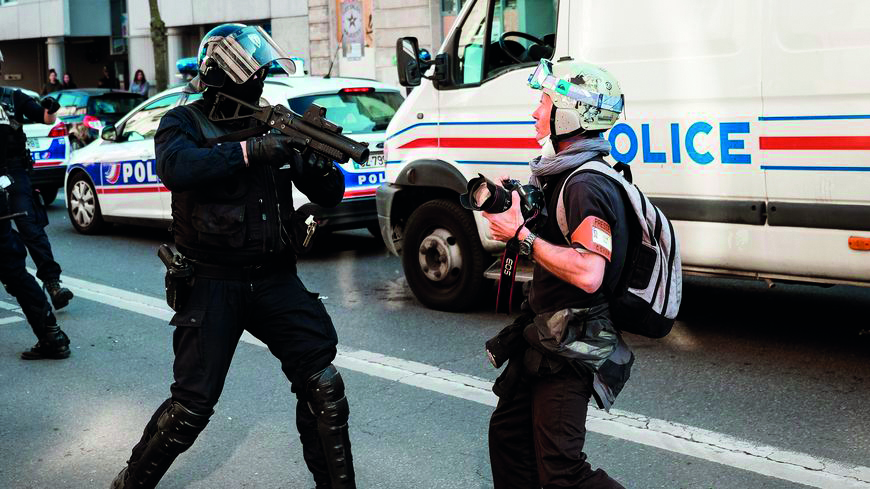Macron restricts freedom to journalists who helped him reach power
- The French General Security Act, which is a brutal curtailment of journalists’ rights, is already in the French Parliament. This is one more attack by President Emmanuel Macron on the 1881 law that guarantees freedom of the press. We have focused on these attacks since their arrival in power in 2017, as well as on the road to the presidency, because the relationship between the media and Macron cannot be kept secret.

We will remember Emmanuel Macron as president who trampled on press freedom to control the word. An example of this is the bill that has been voted on in the French Parliament: the ban on spreading images of police abuse to journalists “in bad faith”; the obligation to have a press letter to cover the demonstrations; and the arrest after giving the eviction mandate, will be a crime for the journalist.
However, it is not Macron’s only attack on the 1881 law that guarantees freedom of the press. The media sphere has changed, as Eric Stemmel’s statistician warns and also in the media: media owners, until recently interested in journalism, are now in the hands of oligarchs. This has consequences, even in the shape of a political sphere that should be democratically elected.
Stemmelen has analyzed Macron’s career in detail since 2012 – that is, since he was the president’s unknown deputy, François Hollande, at the age of 34 – until his inauguration as president of 2017. The result is the book Opération Macron (Operation Macron), which unfortunately – but without any chance – hardly counts in the media. It is interesting to see how a young man nobody knew got the seat of the French president in such a short time. The inevitable element – media monitoring – has been analysed in detail.
One number and one: From January 2015 to January 2017, the Libération, L´Obs, Le Monde and L´Express presses published over 8,000 articles citing Macron and produced covers of dozens of media – pink press, economy and general press, of all. I was officially not a candidate. The number of articles added by potential leftist candidates, Jean-Luc Mélenchon, Arnaud Montebourg and Benoît Hamon, exceeded three. “At first a pretty legend was opened, to tell the truth, swollen with lies,” according to Stemmel. Everything was said and written; that is, few criticisms and many flowers: “Resurrection”, “modernity”, “fresh wind”, “romantic”, “philosopher” – “anti-system” but at the same time “banker for Rothschild”, without fear of the contradictory–.
It is necessary to remove the Soa from these articles to the more general map of the media. The French media are very few: 90% of the press is in the hands of ten oligarchs and the trend is the same in the television and radio sector. Some names? Bernard Arnault, the fourth richest person in the world, with a wealth of 76 trillion dollars, Patrick Drahi with a fortune of 7.1 trillion dollars and Vincent Bolloré with a fortune of 5.7 trillion euros, the seventeenth richest in France. As if the planets were aligned, all three of them are Macron's great friends.
Media, millionaires and Macron, hand to hand
Was politics a friendly deal? Probably. In 2012, Hollande became angry with the oligarchs to tax the richest. They soon saw the young Macron, who had just entered the government and was part of a network of friends composed of his ultra-liberal and wealthy ideas: “I know one: Emmanuel Macron; we have to help,” said Arnault, according to writer Marc Endeweld, –Le Grand Manipullateur: les réseaux secrets de Macron (The Great Manipulator: He is the author of the book The Secret Networks of Macron). We are aware of the succession: the dissolution of the public sector and of the State of Providence in general and fiscal policy in favour of the richest.
But the fact that media owners are friends doesn't mean they can control the house altogether. Macron has difficulty with this reality. On 24 July 2018 it clearly concluded in a public statement on journalism: “There is no longer any journalism that seeks the truth” and “we have the media power that wants to be a judiciary.” He seems to be right, because we are not confined to the truth of the president who wants to control everything and because the need for investigative journalism is fundamental at a time when economic and political interests are so intertwined.
Step by step, attacking freedom of the press
Macron is also the president of CDJM, who has created the Council of Deontology and Media Mediation, and that means a lot. Although it has officially been said to be an “independent self-regulation structure”, it emerged last year at the request of the Government to address the public’s mistrust of the media. A “zepo” as stated in a letter signed by various media. Among the signatories are L’Express, Le Figaro, Franceinfo TV, Le Point, TF1, or others, i.e. those in the hands of their olive friends. Because it is a world between owners and journalists, and the latter are linked to freedom of the press.
“The creation of the CDJM is in a context where the red alarm is ignited. In addition to statements against the press of many political leaders, we have two laws that have passed since the vote of Emmanuel Macron, which are the variant of the 1881 law that guarantees freedom of the press and freedom of information to citizens”, read in the statement. On the one hand, Macron allows a magistrate to conclude that information from journalists in voting times is “false”, without any procedure: censorship, in a way. On the other hand, also in 2019, a law was enacted that is a major obstacle to investigative journalism, a very harsh measure against lanceur d´alerte or internal informants: since then, it has been forbidden by law to obtain documents or whatever is without authorization. However, the 1881 law gave the media the right to keep the source secret. Added to this was the record of the independent media Mediapart in February last year. “Macron’s authoritarian diversion” denounced Mediaparte at the next day’s press conference.
With the support of the Basque Parliament, the bill “General Security” will arrive in January in the Senate. In the meantime, the demonstrations by the citizens and the police abuses that are taking place in the country are continuing. That's what journalists say.
Dagoeneko erreformaren %96 adostuta dute Espainiako Kongresuan erreforma lantzen ari diren alderdiek, eta datorren astean akordio batera iritsiko dira, El Plural.com-en irakurri dugunez.
It is difficult to analyse what is happening in the midst of the wave of propaganda in the day-to-day war in Ukraine. In our case, most media have made an alignment like the hooliga amplifying some events, silencing others and falsehood others, creating collective hysteria. It... [+]
Daniel MC mossoak, Directa hedabideko kazetari Jesús Rodríguezen aurka "funtsik gabe" eta "haren segurtasuna erasotzeko" egin zuela ebatzi du Bartzelonako Justizia Auzitegi Nagusiak (TSJC), eta bi urteko espetxe zigorra berretsi du.























